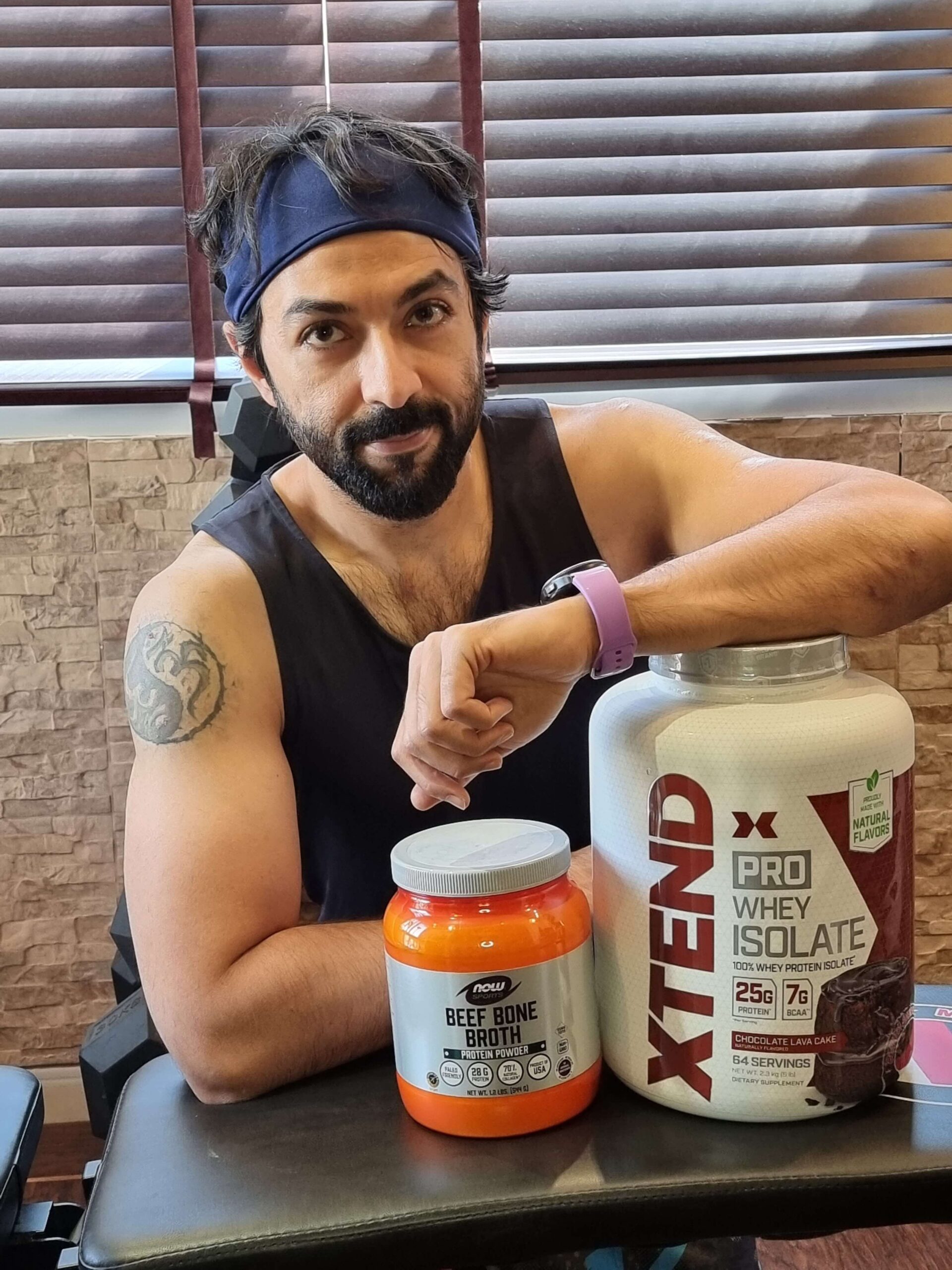
There are lots of different kinds of protein powders on the market to choose from these days. This is a good thing, as it means that there is a protein powder out there for just about everyone.
At the same time, however, it can be overwhelming trying to figure out which protein powder best suits your needs. You know you want the protein content, of course, but what about the other nutrients? Any additional nutritional content will likely benefit your body in some way, but which are the best for you and your lifestyle? Do protein sources really differ that much from each other?
In this article, I will be comparing two popular forms of protein powders against each other. In the battle of bone broth protein vs whey, which will be ideal for you?
In recent years, Bone Broth protein has gained more attention as a viable, non-vegan alternative to whey. However, compared to whey protein, Bone Broth protein is a relatively obscure and unknown protein supplement.
Whey Protein Powder – What Is It and Why Is It Still The Most Popular Type of Protein?
The short and most obvious answer to this question is because it’s a cheap form of highly concentrated protein. Whey is produced as a by-product of producing cheese and other dairy products.
In fact, beyond it being extremely cheap, whey protein is also extremely bioavailable, meaning it’s easily absorbed by your body and unlike some of the plant-based protein powders on the market it’s a complete protein.
Other benefits include:
1. It is very rich in branch-chained amino acids or BCAA’s, as well as all essential amino acids.
2. It mixes easily
3. Tastes great
4. Can be used in a variety of ways.
As a result, it’s great for training and performance, muscle growth and recovery.
The biggest drawback to whey protein is that a lot of people are sensitive to dairy. It’s estimated that 65% of the population is lactose intolerant and although whey protein generally contains very little lactose, it is still often difficult on the digestive system.
To compound the issue, even if you aren’t lactose intolerant you may experience an inflammatory response to milk protein or casein. If you’ve ever found yourself with excessive mucus, acne or feeling stuffed up post a protein shake, that is your body’s way of telling you, you need to find a new protein powder.
What Is Bone Broth Protein Powder?
Bone Broth Protein Powder is made by making Bone Broth the traditional way; by cooking bovine (or chicken) bones along with adhering tendons, cartilage, and meat over long periods of time at low temperatures. This liquid is then spray dried, creating a nutrient rich protein powder.
Generally speaking, bone broth is more expensive and harder to find. So why would you want to make this your go-to protein powder? Because bone broth has a wide range of health benefits.
- It has a wonderful amino acid profile.
- It is rich in hydroxyproline, proline, glutamine, arginine and most importantly GLYCINE. All of these amino acids are essential building blocks for COLLAGEN.
Collagen is the most abundant protein in our body. It’s an incredibly important complex protein, and as we age our bodies naturally produce less and less collagen. It’s estimated that collagen production declines 1% each year.
In addition to being a fantastic way to increase your collagen intake, bone broth is also rich in other beneficial compounds such as GLUCOSAMINE and HYALURONIC ACID. These beneficial compounds help in JOINT and BONE health.
A bit about COLLAGEN
Over the past several years collagen protein has become one of the more popular dietary supplements on the market. It’s long been associated with anti-aging, but as its popularity has increased more studies have been done demonstrating additional benefits.

A few of these key benefits include:
1. Improved Skin Elasticity, hydration, and Moisture Retention
2. Improved Connective Tissue & Joint Health – by decreasing joint pain and arthritic symptoms
3. Improved Gut Health & Digestion – and can help with IBS and leaky gut syndrome
4. Improved hair and nails, and finally..
5. Increases in muscle mass
HIGH lighting GLYCINE
Bone broth is loaded with this non-essential amino acid. Glycine increases the rate of GASTRIC SECRETION – meaning it releases acidic juices that break food down and initiate digestion, helping overall gut health.
There aren’t many foods that are rich in glycine. One of the easiest ways to get more is by using bone broth protein powder. Glycine accounts for nearly 20% of the amino acids in Bone Broth Protein. Compare that to whey protein powder, where glycine only consists of 1.5% of the Amino Acid profile.
So, this is one major reason why you want to consider switching to bone broth protein powder. And what does Glycine do, aside from being an essential component of collagen?
A little bit of everything, really.
That’s not an over exaggeration, as glycine is has been shown to:
- Act as an Anti-inflammatory
- Facilitate the production of Creatine
- Break down fatty acids, aiding is fat loss
- Regulates blood sugar, helping insulin sensitivity
- Elevates serotonin, which can improve both sleep and mood
- Helps create antioxidants, and lastly..
- Help prevent arthritis
When trying to take a call between which of these two options best suits your lifestyle, here are the things you may want to consider.
1. AMINO ACIDS
While both types of protein include a number of amino acids, whey is especially rich in the branched-chain amino acids, or BCAAs. The BCAAs are made up of the amino acids VALINE, LEUCINE, and ISOLEUCINE, which are important for muscle growth & recovery. The average whey protein comprises of 23% as BCAAs, while bone broth only contains about 8%.
BCAAs assist with:
- Increased muscle growth, especially after exercise
- Decreased muscle soreness
- Decreased exercise-related fatigue, and
- Preventing muscle breakdown
2. JOINT, BONE AND SKIN HEALTH
While it may contain fewer BCAAs, bone broth contains significantly more glycine, proline, and hydroxyproline than whey. The average bone broth protein contains about 40% of these, while whey only has about 6%. This helps promote COLLAGEN production, while maintaining healthy levels. And along with glucosamine it promotes joint, bone and skin health.
So, what’s the BOTTOM LINE?
The essential amino acid profile of whey protein may be better suited to those looking for a supplement to specifically aid in workouts, while bone broth protein may be better for those looking for a more general nutritional supplement (which is high in protein).
While they may come from different sources, bone broth protein from animal bones and connective tissue, and whey protein as a byproduct of cheese production, they have some similarities. They are both a good protein source, may aid in weight loss, and are gluten-free.
However, they also have some key differences. For example, whey protein contains a more complete profile of BCAAs, which are great for muscle synthesis and post-workout recovery. It is also generally vegetarian-friendly, though it may not be appropriate for vegans or those with lactose sensitivities.
While it may not be vegetarian- or vegan-friendly, bone broth protein, on the other hand, is generally fine for those on paleo or dairy-free/lactose-free diet. It is also an excellent source of nutrients such as collagen and glycine, which may have multiple beneficial effects in the body, such as improved hair, skin, and nails, digestion, joint health, gut health, in addition to antioxidant and anti-inflammatory properties.
Bone broth protein powders tend to be more expensive than whey protein powders, though they have a wider range of potential benefits. So, with all of these differences, which is better in the battle of bone broth protein vs whey protein?
It really seems to come down to what you are looking for in a protein powder. If you are specifically looking for one to aid in building muscle and workout recovery, then you may be better off with whey protein powder. It is cheaper and contains a more complete profile of essential amino acids that can really enhance your workouts.
If you are looking for a protein powder with a more complete nutritional profile overall, then try bone broth protein powder. Combined with healthy fats, the collagen and glycine content alone may support the health of your body in a number of ways – making it better for optimal overall health.


